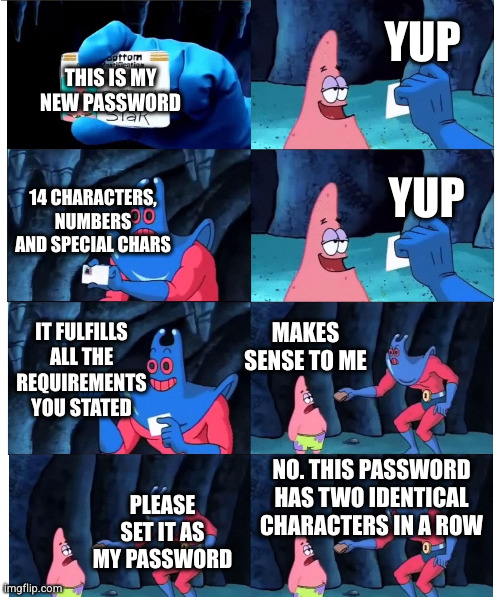this post was submitted on 25 Aug 2024
556 points (98.4% liked)
Cybersecurity - Memes
1975 readers
1 users here now
Only the hottest memes in Cybersecurity
founded 1 year ago
MODERATORS
you are viewing a single comment's thread
view the rest of the comments
view the rest of the comments

The best part to me is that they include all of these rules to increase the security, but then set a maximum length of the password, which from my understanding is the easiest way to add complexity/security to a password.
The actual funny (or sad) thing about this: even without a length limit all they do is make the password less secure because every constraint just reduces the possible password space.
As someone who generates every password with a password manager those sites are a pain in the ass because you have to somehow get these constraints into the generator.
Keepass deals with this fairly well. It remembers the restrictions from the previous password.
It’s sad that this project from Apple has gotten literally zero traction with any password manager that I know of.
Free, open source repository of password requirements that are just an API call away, and you wouldn’t have to worry about tweaking your password generator at all, but no one is using it. Except maybe Apple and I refuse to use their password manager.
https://github.com/apple/password-manager-resources
Maximum length is the biggest red flag to me and was the catalyst for me making the effort to switch to unique passwords per-account years ago. There's just so, so many shitty homerolled security systems out there... and data breaches seem to be a perennial problem these days.
There's just no excuse for limiting the length if you're doing security correctly (other than perhaps a large upper limit just to protect against someone DOSing the backend with a bunch of 100MB strings; 512 characters seems reasonable).
By setting an upper limit, you're basically saying one or more of these things:
arbitrary_list_of_bsMy senior project for uni was replacing the professor's friend's website. We had a meeting to gather requirements, have him demo the site as different kinds of users, etc. Dude said "Hold on a sec" and went to a page with all accounts and their passwords listed. Was like, dude, the hell